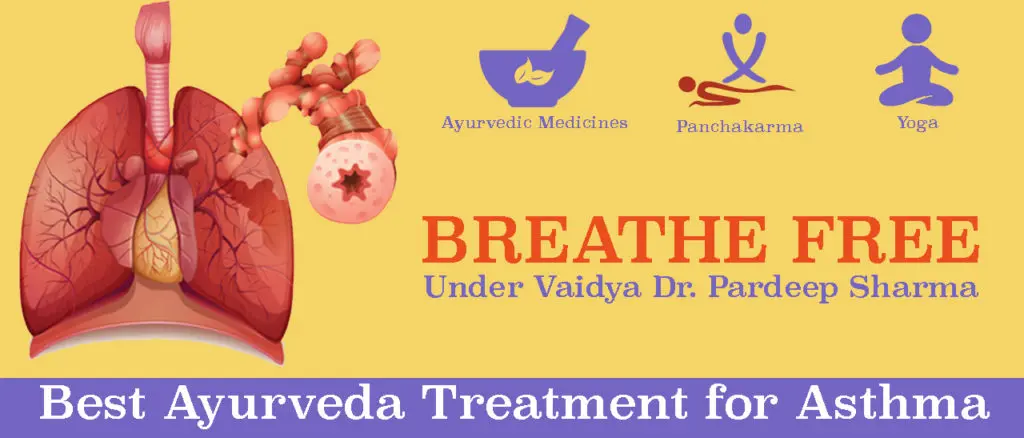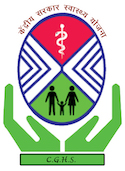A disease that bothers people of every age is Asthma. Medicines help with this condition but dependency on medicines and the severity of the disease keeps on increasing. With time condition worsens. And as a common faith, we all know Asthma is incurable so the patient keeps on wandering from medicine to medicine. In this scenario because of the expertise with chronic diseases, Ayurveda took over. Here we will discuss Ayurvedic treatment for Asthma in detail along with different aspects of Asthma treatment and disease.
Ayurvedic treatment for asthma can help in the complete cure of the condition. And this is not just a claim, we have treated many cases of Bronchial Asthma.
But there are many rules for the treatment and most of the time these rules are not followed, either by patients or by physicians too. Here we will discuss all the aspects of Bronchial Asthma. We need to know everything about Asthma and once we know everything about the disease. This page will discuss the Ayurvedic perspective of the disease and treatment too.
Asthma is a chronic disease where the airways swell, narrow, and produce mucus in excess. It makes breathing difficult and causes symptoms such as wheezing, coughing, and shortness of breath. For some asthmatic patients, bronchial asthma is just a minor nuisance. In contrast, for others, it becomes a significant health issue that not only interferes with their daily activities but also may lead to an asthma attack and is life-threatening.
Treatment of Asthma: Ayurvedic Opinion
कफवातात्मकावेतौ पित्तस्थानसमुद्भवौ |हृदयस्य रसादीनां धातूनां चोपशोषणौ ||
तस्मात् साधारणावेतौ मतौ परमदुर्जयौ |मिथ्योपचरितौ क्रुद्धौ हत आशीविषाविव ||
As per Ayurveda, Asthma is:
- Caused by two doshas- Vata and Kapha.
- This disease occurs in the place of Pitta dosha.
- Asthma depletes all the dhatus, very quickly.
- The disease impacts the activity of the heart.
- This condition looks simple but is a complicated condition to treat.
- The wrong lifestyle and diet complicate the disease.
In Ayurvedic treatment of asthma, people often make the mistake of solely focusing on treating the Kapha. In reality, all three doshas are involved in the pathology of the disease. We all need to focus on all three doshas for a complete cure of Asthma.
This is something same to the Western understanding of Asthma. Modern science believes that the nervous system and immune system both are equally responsible for the condition of Asthma.
So, when we focus on all three doshas in one go, we can achieve a cure for the problem of Asthma with Ayurvedic treatment.

Causes of Asthma as per Ayurveda
Besides this Ayurveda is more elaborative, when it comes to causes of Asthma. Here is the list-
पृथक् पञ्चविधावेतौ निर्दिष्टौ रोगसङ्ग्रहे | तयोः शृणु समुत्थानं लिङ्गं च सभिषग्जितम् ||
रजसा धूमवाताभ्यां शीतस्थानाम्बुसेवनात् |व्यायामाद्ग्राम्यधर्माध्वरूक्षान्नविषमाशनात् |
आमप्रदोषादानाहाद्रौक्ष्यादत्यपतर्पणात् | दौर्बल्यान्मर्मणो घाताद्द्वन्द्वाच्छुद्ध्यतियोगतः ||
अतीसारज्वरच्छर्दिप्रतिश्यायक्षतक्षयात् | रक्तपित्तादुदावर्ताद्विसूच्यलसकादपि ||
पाण्डुरोगाद्विषाच्चैव प्रवर्तेते गदाविमौ | निष्पावमाषपिण्याकतिलतैलनिषेवणात् ||
पिष्टशालूकविष्टम्भिविदाहिगुरुभोजनात् | जलजानूपपिशितदध्यामक्षीरसेवनात् ||
अभिष्यन्द्युपचाराच्च श्लेष्मलानां च सेवनात् | कण्ठोरसः प्रतीघाताद्विबन्धैश्च पृथग्विधैः ||
The verse reads about the different causes and these are as follows-
- Environmental factors:
Dust, smoke, and wind, residing in cold places, use of cold water. - Regimen:
Lack of exercise, excessive sexual intercourse, excess walking, - Foods:
-Intake of excessively dry food,
-Eating at the wrong time.
-Eating extra food.
-Not having the proper amount of food.
-Excessive use of curd, milk, and sesame oil.
-Foods that can cause constipation. - The Other disease which causes Asthma:
-Constipation
-Bloating or too much gas formation in the intestines.
-Accumulation of toxins in the body.
-A quick change in temperature- going from cold to heat or vice versa.
-Problems like chronic diarrhea, rhinitis, fever, and vomiting can cause the condition of Asthma.
The basic idea of Ayurvedic treatment of Asthma is to avoid the causative factors and for this, when we have this detailed description. It helps to treat the patient.
Because of the complicated nature of the disease, it becomes challenging to treat the condition.
We have a scientific protocol for the Ayurvedic treatment of asthma and when this protocol disturbs, the possibility of treatment reduces.
Ayurvedic Treatment for Asthma
Text from Ayurveda talks about the treatments in a very scientific way. These are the “Sutras“. Line of treatment goes according to these lines.
कारणस्थानमूलैक्यादेकमेव चिकित्सितम् | द्वयोरपि यथादृष्टमृषिभिस्तन्निबोधत ||
हिक्काश्वासार्दितं स्निग्धैरादौ स्वेदैरुपाचरेत् | आक्तं लवणतैलेन नाडीप्रस्तरसङ्करैः ||
तैरस्य ग्रथितः श्लेष्मा स्रोतःस्वभिविलीयते | खानि मार्दवमायान्ति ततो वातानुलोमता ||
यथाऽद्रिकुञ्जेष्वर्कांशुतप्तं विष्यन्दते हिमम् | श्लेष्मा तप्तः स्थिरो देहे स्वेदैर्विष्यन्दते तथा ||
स्विन्नं ज्ञात्वा ततस्तूर्णं भोजयेत् स्निग्धमोदनम् | मत्स्यानां शूकराणां वा रसैर्दध्युत्तरेण वा ||
ततः श्लेष्मणि संवृद्धे वमनं पाययेत्तु तम् | पिप्पलीसैन्धवक्षौद्रैर्युक्तं वाताविरोधि यत् ||
निर्हृते सुखमाप्नोति स कफे दुष्टविग्रहे | स्रोतःसु च विशुद्धेषु चरत्यविहतोऽनिलः ||
These are the guidelines for the Ayurvedic treatment of the Asthma. These things goes one after the other. And this is the only way one can treat the condition, properly. Here are the details-
कारणस्थानमूलैक्यादेकमेव चिकित्सितम् : For bronchial asthma treatment one needs to treat the- CAUSE–LOCATION of DOSHAS and ROOT OF THE DISEASE.
स्निग्धैरादौ स्वेदैरुपाचरेत् : In such cases patient needs to go for OLEATION and SWEATING procedures. These are the Panchakarma Procedures- which are external.
तैरस्य ग्रथितः श्लेष्मा स्रोतःस्वभिविलीयते | खानि मार्दवमायान्ति ततो वातानुलोमता : With help of the above Panchakarma Procedures – the phlegm dissolves. Once this phlegm dissolves it gives passage to the trapped Vata.
श्लेष्मणि संवृद्धे वमनं : When Kapha is too much, patient needs to go for Vamana.
This condition needs proper treatment. Because of this condition, we need to check that treatment should not disturb the Vata factor involved in the disease.
This is only Ayurveda which works on the involvement of the “nervous system and immune system”. That is why we can treat the condition of Asthma easily. And these specific details make Asthma treatable in Ayurveda.
You can see when it comes to the Ayurvedic treatment for Asthma, Ayurveda is completely scientific in its approach. Nowhere does Ayurveda mentions going for some Kadha or some single herbs.
The approach of Ayurvedic Treatment of Asthma
How we provide Ayurveda treatment of Asthma Sukhayu is something you need to know. For the treatment of asthma, we need to follow the lines of treatment, discussed above. And make sure it is not about using some alternative medicine alone. Ayurveda is much more promising.
For this, the first thing is- the assessment of the patient. The first assessment helps us to find out what exactly we need to do with the patient. Because – panchakarma is required or not can be decided after assessment only.
There are certain cases where the text doesn’t allow for panchakarma. In those cases, the only way out is Ayurvedic medicines.
For primary consultation, you can consult Vaidya Dr. Pardeep Sharma through Video Consultation.
So that after consultation, you can start the medicines after the primary consultation. But in cases where we need to check the patient- you need to come to Jaipur. Because the main aim is not to start the Ayurvedic medicines. The main aim is to treat the condition. So that you can live properly and can BREATHE- FREELY.
How do Ayurvedic medicines work on Asthma?
During my discussions with Asthma patients, they proudly share with me –
“I tried Vasa because it works like a bronchodilator, but I didn’t get relief!”
“Tulasi works with Asthma but didn’t help me, I am using this for years”.
These talks show, how Asthma patients feel cheated about the Ayurvedic remedies for Asthma.
Is it really, Ayurveda (?) which doesn’t help in Ayurvedic treatment of Asthma or something else!!
Basically, Ayurveda doesn’t promote what we are looking for, from Ayurvedic remedies for asthmatic conditions. In Ayurveda, we don’t have anything which works as a bronchodilator or as an antihistamine. As we have discussed above, the main aim of Ayurvedic medicines is to bring back the balance in lung health. And this is the only way through which we can achieve the complete wellness of a patient.
We need to balance all the doshas and it is nothing like, which cannot be achieved at any point. It is all achievable. Therefore at Sukhayu Ayurved, we are rationale in choosing the right combination for your problem. This makes Ayurvedic remedies for Asthma to work for and your label of “asthmatic patient” removes. Not just the temporary relief in asthmatic symptoms.
Facts on Asthma
- As per Ayurveda, Bronchial Asthma is one of the deadly disease if not addressed properly.
- Ayurveda recognizes the condition with breathlessness as a whole under the disease- Shwas Roga.
- According to Ayurveda there are 5 different types of the Shwas condition.
- The bronchial asthma is the close enough to – Tamak Shwas.
- Ayurveda details the asthma, its causes and treatment better then western medicines.
- Characteristic asthma symptoms include frequent attacks of wheezing, cough, and breathlessness.
- It is a long-term disease condition that intermittently inflames the airways in the lungs.
- Asthma may affect people of all ages but is more common in children.
- It often starts during childhood.
- Asthma affects more than 6 million children and 18 million adults across the globe.
- In children, the prevalence of asthma is higher in boys than in girls. In adults, it is more prevalent in females as compared to males.
- The patient suffering from other allergic conditions such as eczema, food allergies and fever are more at the risk of developing this disease.
- Asthma Symptoms may be more severe in patients with other allergic conditions such as eczema, hay fever or food allergies.
These are facts that help is to look at Ayurvedic treatment of Asthma and Bronchial asthma doesn’t remain just incurable.
Symptoms of Asthma
The symptoms of asthma range from mild to severe and may affect the patient every day or occasionally.
The classical signs and symptoms of asthma include:
- Difficulty in breathing
- Coughing – cupping is worse during the night or during exercise and when laughing.
- Shortness of breath
- Tightness in chest
- Wheezing respiration
* Wheezing respiration refers to the high-pitched sound heard when the air, flows through the narrowed Airways while exhaling. The sound may also be squeaky or wrestling.
The most important point to notice is that the symptoms discussed above can also occur in other lung diseases also. However, the Asthma symptoms are an indication of asthma if the following happens:
- The symptoms go and come back
- Symptoms happen often
- Coughing and other Asthma symptoms are worse at night or early morning
- Exposure to allergens, smoke, stress and exercise trigger the symptom mentioned above.
Signs Asthma Attack
The signs of an asthma attack include:
- Constant tightness of chest coughing and wheezing.
- The patient is breathless and unable to speak.
- Fast breathing
- Rapid heart rate
- Drowsiness
- Confusion
- Dizziness
- Lips and fingers become blue
- Fainting
A mild asthma attack is more familiar with the opening of the airway in a few minutes to a few hours.
A severe asthma attack is rare but lasts long and requires immediate hospitalization.
To control the severe episodes of asthma, it is important to understand the early signs of a bronchial asthma attack.
Early recognizing signs and symptoms of an asthma attack include:
- Frequent cough especially at night
- Losing breath easily
- Getting tired easily
- Signs of allergy such as common cold running nose sore throat sneezing and headache make present
- Decreased lung function difficulty sleeping
Causes of asthma
The cause of asthma is unknown. A combination of environmental and genetic factors is considered responsible for its occurrence.
Possible risk factors are:
1. Heredity – Individuals with a family history of asthma or any other allergic conditions such as food allergy, hay fever, or eczema are more at risk of developing this condition.
2. Atopic Conditions – If you are suffering from other allergic conditions such as eczema, food allergies or hay fever, you are more likely to suffer from asthma.
3. Childhood Illness – Viral respiratory diseases or bronchiolitis during childhood may be a cause.
4. Tobacco Smoke – Exposure to smoke during childhood or smoking during pregnancy increases the risk of asthma in children.
Other potential causes include premature birth, low birth weight, and obesity.
Triggers of the symptoms of asthma are:
- Upper respiratory tract infection such as blue or cold
- Allergens such as pollens, mould, dust mites, feathers or animal fur.
- Certain medications such as nonsteroidal anti-inflammatory
- Stress other emotions
- Weather conditions such as exposure to cold air, air thunder storm, humidity and sudden changes in temperature.
- Food additives such as tartrazine of sulphites
- Exercise
- Gastroesophageal reflux disease or acid reflux
- Alcohol
- Sex
- Food allergy
- Irritants such as cleaning Chemicals and flooring material, smoke, fumes
Acknowledging and avoiding the triggers that worsen or begin asthma is a great help.
Types of Asthma
Based on a potential trigger, asthma patients are of two types:
- Allergic Asthma – Allergic asthma is caused due to exposure to an allergen that causes coughing, sneezing, running nose, swelling and skin rash. This type usually developed in childhood. In most of the cases during early adulthood, allergic asthma goes into remission, but that appears in later ages.
- Non-Allergic Asthma – Non-allergic asthma is caused due to the exposure to extreme weather conditions, irritants, stress, exercise, certain medication, cold, and flu. This type mostly develops after the age of 30 and is common in females. In most of the cases, it follows respiratory tract infection. This type is chronic, year-round around and difficult to deal with.
How Asthma Occurs
Airways are tubular structures that carry air into and out of the lungs.
In patients who have asthma, the inside walls of airways become sensitive to allergens and other irritating conditions such as changes in weather or certain chemicals. The airways get inflamed, sores, and produce excess mucus. Due to extra mucus and hyperactivity, the airways become narrow, and the supply of air to the lungs diminishes. This results in irregular breathing and asthma symptoms such as shortness of breath, wheezing respiration and cough occurs. When the symptoms of asthma patients get worse, it leads to an asthma attack.
The symptoms of asthma change over time. To manage bronchial asthma, it is essential to track the sign and symptoms and adjust the treatment accordingly. Ayurveda treatment for asthma promises to cure this disease off its root so that you can live an active and full life.
Please read the following Posts for a better understanding of Ayurveda Treatment of Allergic Asthma













